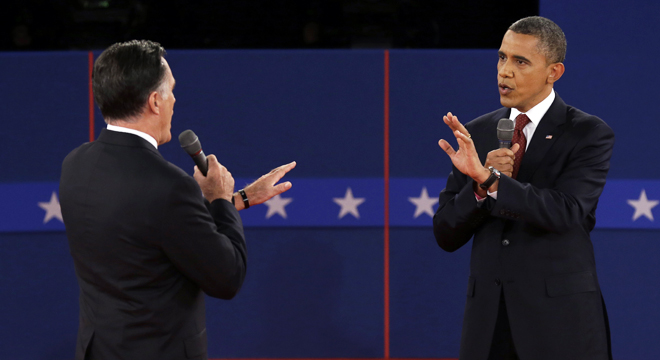As important as forward-looking policy differences between Barack Obama and Mitt Romney have been in the presidential campaign thus far — think Medicare and taxes — more immediate issues, and questions of hindsight, are dominating the election’s final days.
Obama’s lead in Midwest states that benefited from the auto rescue, the damage Hurricane Sandy caused in swing-and non-swing states along the East Coast, and an existing law that will automatically cut tens of billions of dollars a year from defense spending have returned three old controversies to the spotlight, both nationally, and in the swing states that will decide the election.
Each of these issues has been spun to death by the campaigns. But they all have relatively simple back stories, to help readers navigate the spin.
Let Detroit Go Bankrupt
Mitt Romney’s 2009 New York Times op-ed, the headline of which was “Let Detroit Go Bankrupt,” still causes him heartburn. Romney was proposing something very technical — a managed bankruptcy of the sort the Obama administration ultimately oversaw — not a more colloquial understanding of “bankruptcy” as terminal financial ruin. But if you dig even deeper, you find that Romney was opposed to using federal dollars to provide GM and Chrysler a financial bridge through the bankruptcy process. He wanted the private sector to provide that financing, at a time when private dollars weren’t available, even for much smaller, safer investments. Now that Obama’s widely given credit for rescuing the auto industry, and industry experts agree that Romney’s approach would have been ruinous for Detroit, Romney’s trying to muddy the issue. Most recently, he cut an ad attacking Obama for overseeing the bankruptcy process he proposed, and falsely suggesting that the administration’s auto policy has prompted Chrysler to send Jeep manufacturing jobs to China — an allegation that Chrysler itself says is false.
The Romney distortions have reached the point where both GM and Chrysler are fact-checking him. “At this stage, we’re looking at a Hubble telescope-length distances between campaign ads and reality,” a GM representative reportedly said.
Disaster Relief
Hurricane Sandy’s approach and landfall brought renewed attention to comments Romney made months ago during a primary debate, when he lumped disaster relief into the same category of federal budgetary priorities that ought to be handed off to states, or, better yet, private companies.
More recently Romney’s been more circumspect about disaster spending and FEMA — as he has with other issues, like federal education spending, when forced to address specific programs. But the Republican budget he supports calls for boosting military spending, holding Social Security harmless, while capping all federal spending at 20 percent of GDP. More recently, he has also said he wants to spare Medicare from near-term cuts, and restore tens of billions of dollars a year in spending to the program. To make that work, he’d have to cut everything else the federal government does by 53 percent by the year 2022. Throw in education, and the required cuts get bigger. It strongly suggests that, whether the program was organized at the private, state, or federal level, he’d have to cut FEMA spending significantly. His GOP allies in Congress have similarly been reluctant to increase FEMA spending, and have opposed providing the agency extra funds to cope with emergencies, unless those funds were offset by cuts elsewhere in the federal budget.
Defense Cuts
If Obama wins Virginia, he’ll likely win the whole election. Which is why Republicans there are pushing the idea that, automatic scheduled cuts to defense spending, are his idea and his fault. They’re referring to the “sequester” — an enforcement mechanism Congress passed on a bipartisan basis and Obama signed to resolve the debt limit fight last summer. It will cut defense and domestic spending deeply and indiscriminately unless Congress replaces it with a bipartisan deficit reduction plan, or agrees to simply repeal it. Republicans want Obama to own the sequester’s defense cuts, despite their votes for it, because that piece of the sequester originated in the White House. There’s plenty of blame to go around, but the background here is much more complicated.
The idea of including an enforcement mechanism in the debt limit deal was a consequence of two different demands: one, by John Boehner, that every dollar in new borrowing authority Congress provided be accompanied by a dollar cut to federal spending, another, by Obama, that Congress raise the debt limit enough to take the issue off the table through election season.
To meet both demands, Congress had to assure that the budget would be cut over 10 years by over $2 trillion, but could only agree on about $1 trillion up front. The sequester was designed to threaten both Democratic and Republican priorities, so that both parties would negotiate in good faith to avoid it. That’s why half of it targets domestic programs. Democrats offered up several Republican sacred cows to fill in the other half, including, for instance, the Bush tax cuts for top earners. Republicans ultimately agreed to the defense cuts.
The GOP’s opposition to higher taxes on top earners has been the single largest impediment to replacing the sequester, and now that it’s weeks away from taking effect, Republicans are blaming its defense cuts on Obama. At the final presidential debate, Obama insisted that the sequester “will not happen”, but it’s still unclear how it’ll be avoided, whoever wins the election.










